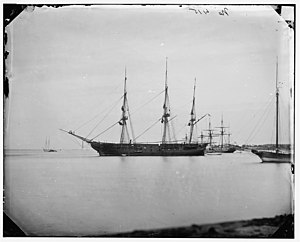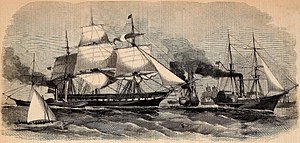USS Sabine (1855): Difference between revisions
Broichmore (talk | contribs) →References: Commons link |
|||
| Line 111: | Line 111: | ||
[[Category:Ships of the Union Navy]] |
[[Category:Ships of the Union Navy]] |
||
[[Category:American Civil War patrol vessels of the United States]] |
[[Category:American Civil War patrol vessels of the United States]] |
||
[[Category:United States Navy Louisiana-related ships]] |
|||
[[Category:United States Navy Texas-related ships]] |
[[Category:United States Navy Texas-related ships]] |
||
[[Category:1855 ships]] |
[[Category:1855 ships]] |
||
Revision as of 08:11, 9 March 2022
This article includes a list of general references, but it lacks sufficient corresponding inline citations. (October 2011) |

| |
| History | |
|---|---|
| Name | USS Sabine |
| Namesake | Sabine River |
| Builder | New York Navy Yard |
| Laid down | 1822 |
| Launched | 3 February 1855 |
| Commissioned | 23 August 1858 |
| Decommissioned | 1877 |
| Fate | Sold, 23 September 1883 |
| General characteristics | |
| Class and type | Brandywine-class frigate |
| Tonnage | 1726 |
| Length | 202 ft 6 in (61.72 m) |
| Beam | 47 ft (14 m) |
| Draft | 21 ft 6 in (6.55 m) |
| Propulsion | Sail |
| Speed | 12 knots (22 km/h; 14 mph) |
| Complement | 400 officers and enlisted |
| Armament | 44 to 50 guns |
The first USS Sabine was a sailing frigate built by the United States Navy in 1855. The ship was among the first ships to see action in the American Civil War. In 1862, a large portion of the USS Monitor crew were volunteers from the Sabine.
She was built at the New York Navy Yard. Her keel was laid in 1822, but she was not launched until 3 February 1855. During this period, she underwent various alterations, the most extensive being a lengthening of her hull by twenty feet. Built essentially from Brandywine plans, she was commissioned on 23 August 1858, Capt. Henry A. Adams in command.
Service history
Paraguay Expedition and Home Fleet, 1858–1861

Her first cruise took the frigate to Montevideo and Buenos Aires in October 1858 with the Paraguay expedition, a task force commanded by Flag Officer William B. Shubrick, after that country's firing on USS Water Witch. She conveyed Commissioner Bowlin and served as flagship during the voyage to South America, but was not officially considered part of the expedition fleet, as she was not designed to act against Paraguay, not being able to ascend the river.[1] The expedition won the United States an indemnity, an apology, and a renewed treaty. Sabine then operated out of New York with the Home Fleet until July 1861.
Civil War, 1861–1865


Through July and August, she was out of commission at Portsmouth Navy Yard. Recommissioning on 30 August, she was ordered to join the Atlantic Blockading Squadron on 9 September.

During the Civil War, Sabine was actively employed along the east coast searching for Confederate raiders. She participated in the relief and reinforcement of Fort Pickens, Florida, in April 1861, under command of Capt. Adams; the rescue of 500 marines and the crew of chartered troop transport Governor during a violent storm off South Carolina on 2 and 3 November 1861; the search for Vermont in March 1862, after the ship-of-the-line had been badly damaged by a storm while sailing to Port Royal, South Carolina; and the hunt for CSS Alabama in October 1862 and CSS Tacony in June 1863.
Sabine returned to New York for blockade duty with the North Atlantic Blockading Squadron until ordered in August 1864 to Norfolk, Virginia as a training ship for Navy apprentices and landsmen.
Training ship, 1865–1877
After the war, she was transferred to New London, Connecticut for the same purpose until 1868. In 1867, an apprentice on Sabine, Frank Du Moulin, was awarded the Medal of Honor for rescuing a crewmate who had fallen from the rigging into the water.[2] In 1869 and 1870, the ship conducted midshipman training cruises to European and Mediterranean ports. In 1871 Sabine was repaired at Boston; and, from 1872 to 1876, she served as a receiving ship at Portsmouth, New Hampshire. In 1877, she was laid up until she was sold on 23 September 1883 at Portsmouth to J.L. Snow of Rockland, Maine.
Memorials
The last remaining armament from the Sabine, a 6.4 inch 100 Pounder Parrot Rifled Naval Cannon, currently resides on display outside the Grand Traverse County courthouse in Traverse City, Michigan. It was one of the two 100 pounder rifled cannons that were mounted on swiveling carriages on the Sabine. The cannon was donated to Grand Traverse County by Senator William Alden Smith in 1910.
See also
References
- ^ Expenses of the Paraguay Expedition – House of Representatives, 36th Congress, 1st Session, Mis. Doc. No. 86 (11 May 1860), p. 142
- ^ "Medal of Honor Recipients – Interim Awards, 1866–1870". Medal of Honor Citations. United States Army Center of Military History. 3 August 2009. Retrieved 14 July 2010.
External links
 Media related to USS Sabine (ship, 1855) at Wikimedia Commons
Media related to USS Sabine (ship, 1855) at Wikimedia Commons
![]() This article incorporates text from the public domain Dictionary of American Naval Fighting Ships. The entry can be found here.
This article incorporates text from the public domain Dictionary of American Naval Fighting Ships. The entry can be found here.
